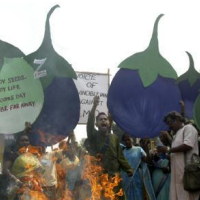GM Crop Trials Bloom in India
 Activists protesting against Bt brinjal in January 2010 (file photo: AP)
Activists protesting against Bt brinjal in January 2010 (file photo: AP)
The Maharashtra state government has announced its permission for open field trials in genetically modified (GM) strains of rice, chana (chickpeas), maize, brinjal and cotton. Maharashtra is now the fourth state after Punjab, Delhi and Andhra Pradesh to approve open field trials.
GM crops are those whose seeds have been genetically altered to provide additional benefits, such as resistance to pests or to increase the output.
“We have, at the moment, only given permission for field trials in some crops. We will closely monitor and wait for the results of these trials before taking any further steps,” Chief Minister Devendra Fadnavis told The Indian Express.
He added that the decision was based on the recommendations of a state-level committee headed by Anil Kakodkar, former chairman of the Atomic Energy Commission. It considered individual crop applications before presenting its recommendations last week.
Kakodkar said that the green signal has been given in Maharashtra only for confined field trials in cases where tests at the laboratory/greenhouse level had shown promising results.
“We examined crop proposals further from the point of view of their importance to our state, while ensuring all safety precautions were in place,” he told The Indian Express.
Confined trials are typically carried out in small plots of one hectare or less, and are meant primarily to collect data on the potential bio-safety impact of the GM crop.
Field trials have been opposed by the Swadeshi Jagran Manch, the economic wing of the RSS. When asked about likely protests from Sangh affiliates to Maharashtra’s decision, Fadnavis said that “my government will not compromise on national interest or the welfare of our people”.
The Genetic Engineering Appraisal Committee under the previous UPA administration’s Environment Ministry had permitted field trials in GM crops, but it had inserted a condition requiring separate no-objection certificates (NOCs) from states for field trials.
The NOCs were introduced by former environment minister Jairam Ramesh in 2011 after Bihar, Kerala, Rajasthan and Madhya Pradesh refused trials of GM crops, arguing that agriculture is a state subject.
Several more states have since denied permission, including Gujarat, Chhattisgarh, Haryana, Bihar, West Bengal, Orissa, and Tamil Nadu.
Nevertheless, India is seeing an upsurge in the area covered by GM crops. At 11.6 million hectares, the area of GM crops in India is now equivalent to Canada’s and more than China’s.
According to Hindustan Times, this jump is largely due to the first crop that India approved in 2002: Bt Cotton. In contrast, Canada grows a range of such GM crops, canola and soyabean.
India’s adoption rate of Bt cotton has been 95%. Latest provisional estimate by economists G Brookes and P Barfoot indicate that India had enhanced farm income from Bt cotton by US$16.7 billion (about Rs. 98,000 crores) between 2002 and 2013.
But there has been a moratorium on the cultivation of GM food crops since 2010, when the then UPA government stopped Bt brinjal EE-I due to concerns aired by green activists.
Critics, such as the Alliance for Sustainable and Holistic Agriculture, claim macroeconomic data indicate that GM crops provide no benefits. For instance, it says that in the US, food insecurity has risen from 12% in pre-GM 1995 to 15% in 2011.
Yet, for the third year in a row in 2014, developing countries planted more GM crops than industrialised nations. The recent decision by Maharashthtra has confirmed the slow but inexorable spread of these crops across India.
- Karan Singh
To Learn More:
Maharashtra clears trials for GM food (by Shubhangi Khapre, The Indian Express)
Despite stiff resistance, India’s GM crop size now equals Canada’s and more than China’s (by Zia Haq, Hindustan Times)
Centre last word on GM crops; nod for 'confined' field trial (PTI)
India will soon be game for GM crops (by Jyotika Sood, DNA)
- Top Stories
- Controversies
- Where is the Money Going?
- India and the World
- Appointments and Resignations
- Unusual News
- Latest News
- India College Chain’s Expansion into U.S. Draws Opposition from Massachusetts Officials over Quality of Education
- Milk Shortages in India Tied to Release of New Movies Featuring Nation’s Favorite Stars
- Confusion Swirls around Kashmir Newspaper Ban in Wake of Violent Street Protests
- Polio-Free for 5 Years, India Launches Vaccine Drive after Polio Strain Discovery
- New Aviation Policy Could Increase Service, Lower Ticket Prices






Comments